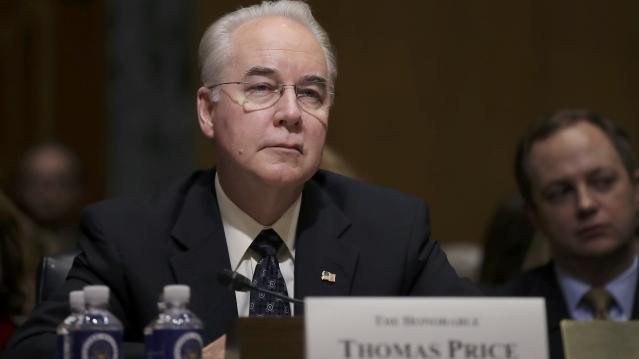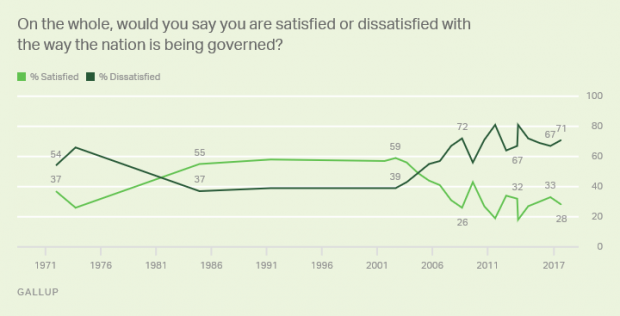The Crazy Reason Treasury Department Officials Can’t Get Their Work Done
Treasury Department officials are being driven to distraction these days, but it’s not because of the expiring debt ceiling or other pressing financial controversies.
Instead, loud music from a New Orleans-style street band known as Spread Love has reportedly driven some officials and employees at the Treasury building to wear earphones to block out the noise and even move meetings to other parts of the building to find some peace and quiet.
Related: The Next Debt Crisis Could Be Much Worse than in 2013, GAO Warns
“We have to relocate our conference calls,” one Treasury employee told The Washington Post. “We can’t have meetings in that corner of the building anymore. It’s like they’re playing music in the building.”
Members of Spread Love have become fixtures of downtown Washington’s street scene and are collecting generous donations for playing their drums, trombone and other brass instruments. Tourists and other office workers out during their lunch hour appear to love the group, but not so the serious-minded economists and bean counters at the Treasury – especially when the band moves within easy shouting distance at the corner of 15th and G Streets NW.
Treasury Secretary Jack Lew’s staff members aren’t the only ones complaining about the jarring music. Partners and associates at the law firm of Skadden, Arps, Slate, Meagher & Flom find it hard to concentrate on their cases with daily interruptions. It got to the point that the firm dispatched a security guard to offer band members $200 a week if they would play somewhere else. Lonnie Shepard, one of the trombonists, told the newspaper that he laughed at the offer because “We can make that in an hour.”
Related: End of Sanctions Worth Hundreds of Billions to Iran
Rob Runyan, a spokesperson for the Treasury Department, said that employee complaints have made their way to the office of the assistant secretary for management, Brodi Fontenot, but there really wasn’t much that could be done.
“The band and other street noise are part of the distractions of working in downtown D.C.,” Runyan said in an interview Friday.
Trump’s Cabinet Would Benefit from Tax Plan Too
“Eliminating the estate tax would save the Trump Cabinet over a billion dollars," Oliver Willis writes. "Like Mnuchin, Trump’s secretaries would make out like bandits. Commerce Secretary Wilbur Ross would get an extra $545 million. The family of Education Secretary Betsy DeVos would rake in $900 million. Linda McMahon, head of the Small Business Administration, and her husband, WWE founder Vince McMahon, would take in $250 million. Trump’s own net worth is in dispute, thanks to his failure to reveal his tax returns, but based on his estimated net worth of $3 billion, the estate tax scheme would net him $564 million.” (Shareblue Media, Bloomberg)
A Liberal Economist Shoots Down the GOP’s Fiscal Chicken Hawks
Republicans want a tax cut, but they don’t want to fully pay for it and may be willing to increase the deficit by $1.5 trillion over 10 years. This would continue a troubling cycle, economist Jared Bernstein writes, in which supposed fiscal conservatives “use the deficit argument to block spending, promote fiscal austerity, and small government, conveniently tossing deficit concerns aside when it comes to tax cuts.”
You’ll hear arguments about how increased economic growth will make up for the budgetary effects of the tax cuts, but don’t believe them. “Our fiscal history on this point is clear: Cutting taxes loses revenues, which, unless offset by higher taxes elsewhere or spending cuts, increases the budget deficit, which in turn raises the debt.” When this happens again, and the promised growth effects don’t materialize, the tax cutters will go back to pushing for spending cuts.
The country faces a number of serious challenges, including an aging population that by itself will require increased government spending, and we need a tax policy that does more than drive up the deficit. “The problem with structural deficits — ones that go up even in good times — is that they reveal that we’re unwilling to raise the necessary revenues to support the government we want and need. This enables those who whose goal is to shrink government to point to deficits and debt as their proof that we can’t afford it, whatever ‘it’ is, except when ‘it’ is tax cuts.” (New York Times)
Health Secretary Tom Price Under Fire for Use of Private Jets

Back in 2009, Tom Price spoke out against House Democrats who wanted to spend $550 million on private jets for lawmakers to use. A Republican representative from Georgia at the time, Price told CNBC that the purchase of the jets was “another example of fiscal irresponsibility run amok.” Now Secretary of Health and Human Services, Price seems to have changed his mind about the virtue of government officials using private jets at taxpayer expense. Just last week, Price used a chartered private jet to travel to three HHS events — including one at a resort in Maine — at an estimated cost of $60,000, Politico reports.
While previous HHS secretaries typically flew commercial, reports indicate that Price has been traveling by private jet for months. “Official travel by the secretary is done in complete accordance with Federal Travel Regulations,” an HHS spokesperson told Politico.
Critics on Twitter have been harsh:
More in-your-face kleptocracy from Tom Price.Take food stamps from poor, hungry kids- spend $25k from taxpayers to charter plane to Philly
— Norman Ornstein (@NormOrnstein) September 20, 2017
1️⃣ Attack Medicaid while trading health stocks.
— Harry Stein (@HarrySteinDC) September 20, 2017
2️⃣ Spend funds that could give someone 4 years of Medicaid coverage to fly a private jet. https://t.co/GO5cfJgWgO
First Mnuchin, now Tom Price. The @realDonaldTrump Cabinet has a big problem charging taxpayers for private flights. https://t.co/th1QbGdfT7
— Ben White (@morningmoneyben) September 20, 2017
Social Security Benefits Due for a Bigger Bump in 2018

In a few weeks the Social Security Administration will announce its cost-of-living adjustment, or COLA, for 2018. Inflation data for the month of August suggests that the adjustment could be the highest in five years, possibly over 2 percent, according to the Washington Examiner. Adjustments for the past five years have been relatively small: The cost of living adjustment for 2017 (announced last October) came in at a modest 0.3 percent, and the adjustment for 2016 was zero. Some retirees have complained in the past about small COLAs, but it’s worth remembering that higher adjustments are driven by higher inflation, which is bad news for people living on fixed incomes.
Americans Are Less Satisfied with Government Now Than a Year Ago
Gallup finds that just 28 percent of Americans are satisfied with the way the nation is being governed, down from 33 percent a year ago. And as we approach some potential fiscal battles, it's worth noting that the lowest satisfaction levels since Gallup started updating the measure annually in 2001 came in 2011 (19 percent) after a debt ceiling showdown that led to the U.S. credit rating being downgraded by S&P analysts and in 2013 (18 percent) during a federal government shutdown.

